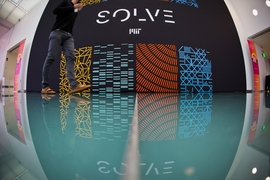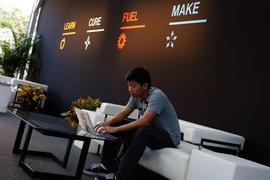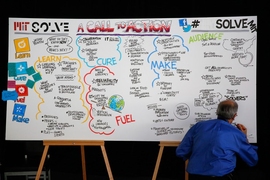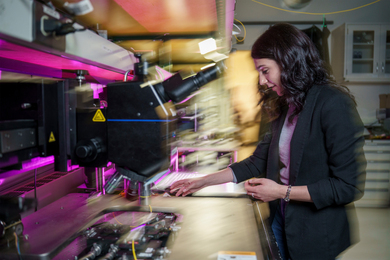On any given day, Kendall Square is a locus for some of the world’s most innovative problem-solvers. But that rose to a whole new level recently, during a jam-packed week of events celebrating innovation, technology, and the arts in Greater Boston.
From intimate “lunches with changemakers” at restaurants around Kendall Square, to Solve at HUBweek — MIT’s two-day event that convened innovators tackling daunting global problems — the Institute’s neighborhood was buzzing with activity. These gatherings were part of HUBweek, a civic collaboration across Boston, founded by MIT, Harvard University, The Boston Globe, and Massachusetts General Hospital, that involved more than 115 events and 130 participating organizations.
Solve at HUBweek took place at the MIT Media Lab on Sept. 27 and 28, when participants selected through an open online innovation platform pitched their ideas for meeting a range of challenges, from removing carbon dioxide from the atmosphere to educating children in refugee camps around the world. The challenges drew over 350 proposals and applications, which were assessed by expert judges from a broad array of sectors.
“Solve is off to an outstanding start this year,” says MIT Provost Martin Schmidt. “The atmosphere was crackling with energy as teams pitched their ideas during HUBweek, and the next stages in Solve’s cycle will yield projects that are both ambitious and primed for real-world implementation.”
Galvanizing solutions
Solve’s mission is to develop and implement real and lasting solutions to the world’s greatest challenges — from education and health to energy and inequality. Solve brings together technologists and researchers, social entrepreneurs and business leaders, policy makers, change agents, and activists to work on specific actionable challenges. Solve then creates partnerships to fund and implement the best solutions.
A significant part of Solve’s work centers around hosting open competitions across four pillars — Learn, Cure, Fuel and Make. Anyone can participate in a Solve challenge and submit a solution. If a participant’s idea has the potential for impact, they will be invited to one of Solve semifinal events to pitch their idea, with the chance to receive support from Solve and its partners, and participate in Solve’s flagship Solve at MIT event, scheduled for spring 2017. Solve at HUBweek was the first semifinal; additional semifinals taking place in early 2017 will be announced in the near future.
Day one of Solve at HUBweek on Sept. 27 focused on Solve’s “Make” Pillar, featuring the Inclusive Innovation Competition (IIC). Four companies received grand prizes of $125,000 apiece, and 16 other organizations each received $25,000, to support their innovative efforts to leverage new technologies to expand economic opportunities for workers. Developed by the MIT Initiative on the Digital Economy in collaboration with Solve, the competition received support from The Rockefeller Foundation, The Joyce Foundation, the NASDAQ Foundation, Joseph Eastin, and Eric and Wendy Schmidt.
"All of the IIC winners exhibited amazing innovation and a commitment to creating a more inclusive future. They are leveraging technology to improve economic opportunity for the broad middle and base of the income distribution," says Erik Brynjolfsson, a professor of information technology at MIT Sloan and the director of the MIT Initiative on the Digital Economy. "Each one is proof that technology can be used as a tool to create jobs and help people — customers, employees, and employers alike," says Brynjolfsson, who is also the Schussel Family Professor of Management Science.
The morning of Solve’s day two was devoted to presentations for the “Learn” pillar’s core challenge: how to improve learning outcomes for and provide quality education to refugee children around the world. Six semifinalists pitched their solutions, and three were chosen to advance by the panel of judges, including one proposal for a crowdsourced online platform enabling teachers around the world to coach volunteers working with students in camps.
In the afternoon, semifinalists in the two “Fuel” pillar challenges proposed approaches to remove carbon from the atmosphere, and to use digital technologies to price greenhouse gas emissions. Safi Sarvi, a venture based in Kenya that makes biomass-based, carbon-negative fertilizers that improve farmers’ yields by up to 30 percent, was chosen to advance as a finalist.
Alex Amouyel, the executive director of Solve, emphasizes that the HUBweek events were one step in a larger process. The Learn and Fuel challenges will reopen this month on Solve CoLab, for new proposal submissions to expand the roster of potential solutions, with semifinals taking place in early 2017. Meanwhile, the four finalists chosen at this first Solve event at HUBweek will be supported and mentored over the next several months by Solve staff, MIT faculty, and experts from other institutions, with the aim of brokering partnerships to fund, pilot and implement the solutions pitched.
“The idea of Solve rests on the premise that there is talent and ingenuity everywhere,” says Alex Amouyel, executive director of Solve. “There are teachers is U.S. public schools, there are adolescent girls in Afghanistan, there are young men in Tunisia, with lots of world experience and intelligence and generosity, who seek opportunities to develop these talents and to use their skills. It’s our job to unearth their ideas and provide a platform that connects them with resources to help change their community and the world.”
“We are very excited to work with the finalists we selected and to support them to ensure their solutions get piloted and implemented,” she says.
Civic engagement and celebration
Beyond Solve, almost 40 different events took place as part of HUBWeek’s “Inside Kendall Square” program. These included a “story slam” with tales from some of Boston’s leading female entrepreneurs and innovators, and the “lunches with changemakers” series, which brought members of the public together with MIT experts to discuss issues ranging from artificial intelligence to novel vehicles for financing startups. Another popular event was an interactive session titled “Get MIT on Your Team,” led by School of Engineering dean Ian Waitz, that explored ways for local organizations to partner with students and faculty at MIT.
“HUBweek is a citywide festival of how Boston is shaping the future,” says Kathleen Kennedy, president of the MIT Enterprise Forum and former president of Technology Review, which helped launch and produce Solve in 2015. “It’s a new type of civic engagement.”
Another highlight, according to Linda Pizzuti Henry, HUBweek’s co-founder and chair, was Friday’s “Demo Day,” which brought some of the region’s most promising inventors and industry leaders to the Hynes Convention Center to judge pitch competitions. These competitions gave out more than $350,000 in cash prizes to promising companies.
“We feel like there’s a power of convening in shaping the narrative of the region — that this is where the future is being built,” says Henry. “I’m really thrilled with the engagement that Solve has had, and its trajectory forward. And it’s really exciting to have HUBweek as a convener for these conversations.”











